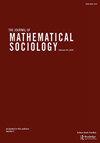A dynamic process reference model for sparse networks with reciprocity
IF 0.7
4区 社会学
Q3 MATHEMATICS, INTERDISCIPLINARY APPLICATIONS
引用次数: 4
Abstract
ABSTRACT Many social and other networks exhibit stable size scaling relationships, such that features such as mean degree or reciprocation rates change slowly or are approximately constant as the number of vertices increases. Statistical network models built on top of simple Bernoulli baseline (or reference) measures often behave unrealistically in this respect, leading to the development of sparse reference models that preserve features such as mean degree scaling. In this paper, we generalize recent work on the micro-foundations of such reference models to the case of sparse directed graphs with non-vanishing reciprocity, providing a dynamic process interpretation of the emergence of stable macroscopic behavior.具有互易性的稀疏网络的动态过程参考模型
许多社交网络和其他网络表现出稳定的规模缩放关系,例如平均度或往复率等特征随着顶点数量的增加而缓慢变化或近似恒定。建立在简单伯努利基线(或参考)度量之上的统计网络模型在这方面往往表现得不切实际,导致稀疏参考模型的发展,这些模型保留了平均度缩放等特征。在本文中,我们将这些参考模型的微观基础的最新工作推广到具有非消失互易的稀疏有向图的情况,提供了稳定宏观行为出现的动态过程解释。
本文章由计算机程序翻译,如有差异,请以英文原文为准。
求助全文
约1分钟内获得全文
求助全文
来源期刊

Journal of Mathematical Sociology
数学-数学跨学科应用
CiteScore
2.90
自引率
10.00%
发文量
5
审稿时长
>12 weeks
期刊介绍:
The goal of the Journal of Mathematical Sociology is to publish models and mathematical techniques that would likely be useful to professional sociologists. The Journal also welcomes papers of mutual interest to social scientists and other social and behavioral scientists, as well as papers by non-social scientists that may encourage fruitful connections between sociology and other disciplines. Reviews of new or developing areas of mathematics and mathematical modeling that may have significant applications in sociology will also be considered.
The Journal of Mathematical Sociology is published in association with the International Network for Social Network Analysis, the Japanese Association for Mathematical Sociology, the Mathematical Sociology Section of the American Sociological Association, and the Methodology Section of the American Sociological Association.
 求助内容:
求助内容: 应助结果提醒方式:
应助结果提醒方式:


